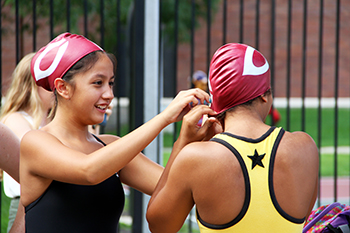How sports can empower women and bring gender equality

“She died on May 17, and coincidentally, I have #survived,” reads one of the thousands of post-it notes mourning the Gangnam station victim, stabbed to death by a Korean man with misogynic values. In 2016, Korea began its new year with a sequence of gender violence, including the Gangnam station murder, the gang rape by parents of a school teacher in South Jeolla province, and a sexual harassment case surrounding singer Park Yoo-chun, all of which focused attention on previously neglected gender issues in our society. #Survived created a belated venue for and amplified public dialogue regarding gender discrimination in Korea. In efforts to further the discussion, Ewha Voice is delving into to the root of the issue; here, we investigate how sports can empower women and young girls. This week, Ewha Voice invites you to Douglas Park in Chicago, Illinois, to explore sport’s potential to fight gender norms and create a foundation for gender equality by leveling the playing field for both men and women.
Girls, sports, empowerment and “Girls in the Game”
It is 7 a.m., on a rainy Saturday morning at Foster Beach in the city of Chicago, where hundreds of children have gathered with their families to attend the annual “Life Time Kids Tri.” Today, through the pouring rain, the kids will run, swim and bike to the finish line, into the cheering crowd of their families and friends.
At the Girls in the Game booth, girls are waiting for their bikes to arrive. The bus that was carrying their bikes got lost in the disastrous weather, and was having trouble navigating its way to the triathlon site. While the girls waited, Trinity, Nataly and Tiara changed into their Girls in the Game t-shirts, and chatted away. For most of these girls, this will be their first triathlon, which they have been training for since June.
On Aug. 25, with just two days until the big day, the kids arrived at Douglas Park for their last training session. With the afternoon sun piercing through the spotless sky, one by one, parents drove by the communal outdoor pool to drop off their daughters.
“We train every single week, on Thursday,” said Jasmyne, explaining the weekly 3:30 p.m. session at Douglas Park, some distance west of bustling downtown Chicago. The training sessions that the girls have gathered for are programmed not only to provide physical training, but also include leadership and health components, as well as discussions of body image, healthy eating and positive relationships.
“It’s very fun, and everyone encourages you to keep trying, and to do better,” said twelve-year-old Nataly with a smile. “Personally, my goal for Saturday is just to finish the entire race.”
Girls in the Game, a Chicago-based non-profit organization, was established in 1995 with a mission to provide girls the opportunity to be physically active and become strong members of society.
“We started off with a small group of women who contributed a lot of the success in their professional life to their background of doing sports,” explained Michelle Sperzel, the CEO of Girls in the Game. “They came together and started programming athletic activities for girls. But as the needs of girls evolved, they added additional components like leadership or health.”
By integrating these elements into their programs, Girls in the Game was able to more effectively help build the ‘whole girl.’
“With these different layers, we try and serve the ‘whole girl,’ beyond just the physical piece,” Sperzel continued. “How can we empower her, and improve her self-confidence? How can we help her see her own perseverance?”
Answers to these fundamental questions are embedded into all their programs, serving girls from 7 to 18 years of age. Through the programs, the girls, one by one, have been causing a ripple effect, changing her family and community members’ attitudes towards sports and it’s potential to make change. According to Sperzel, sometimes girls love the programs so much that they recruit their own sisters into the games.
“If the family understands the lessons that are being taught here, then the lessons are going to be reinforced at home, and that itself will come about to change within the girl and throughout society,” Sperzel shared. “We provide 90 minutes, one day a week in the course of eight weeks. How can we have the lesson be reinforced with her peer network? Is she going to it with some of her friends or family, so that they’re reinforcing the lessons that they’re learning together?”
Each year, Girls in the Game serves over 3,200 girls. Now, they are expanding beyond Chicago to Baltimore and Dallas. Their programs include After School programs, Game Days, Summer Camps and their unique Teen Squad; each of which continues to create an arena where girls can experience sports and make them a part of their everyday lives.

